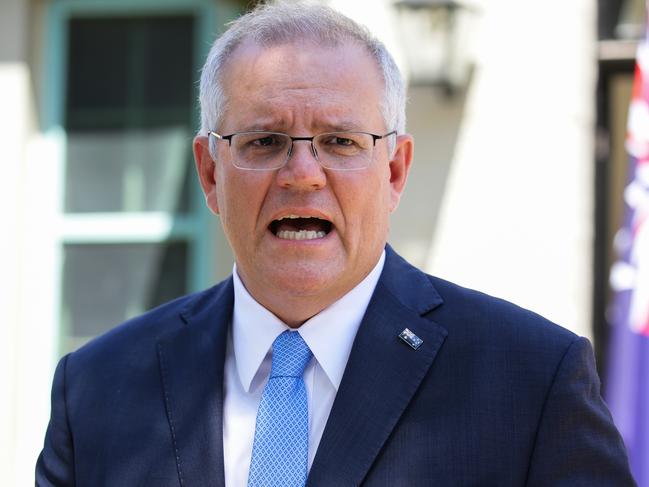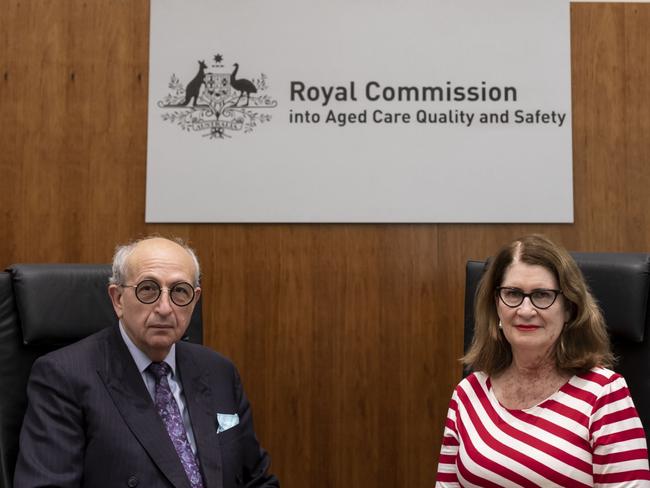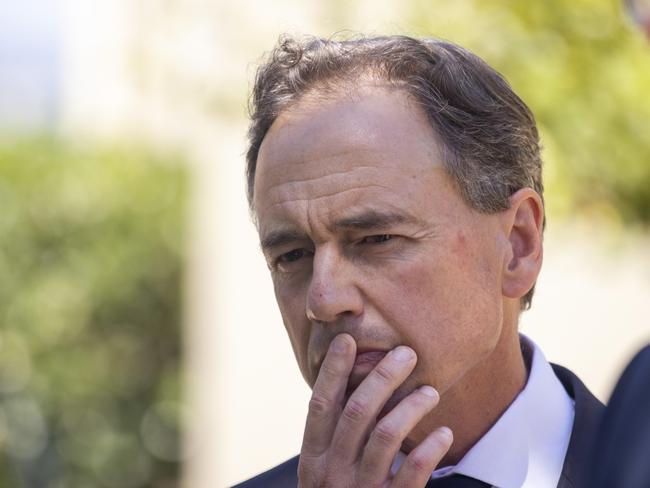Aged care royal commission: Elderly Australians starved, assaulted in nursing homes
Elderly Australians are starving, dying in pain and suffering assaults in nursing homes, a harrowing report has revealed. WARNING: Distressing content
National
Don't miss out on the headlines from National. Followed categories will be added to My News.
Elderly Australians are starving, dying in pain and suffering assaults in neglectful nursing homes, a Royal Commission has revealed in a harrowing report that flags a new levy on taxpayers to boost aged care funding.
Prime Minister Scott Morrison pledged an extra $452 million for aged care this year after reading the report’s evidence of “sad and confronting’’ abuse and neglect affecting one in three nursing home residents.
He said he was “quite attracted’’ to the Royal Commission recommendation for paid carer’s leave, so workers can take time off to care for elderly or ailing parents.

Mr Morrison announced an extra 1500 snap inspections of aged homes every year to crack down on abuse and neglect, and promised more money in the May budget.
He said the government would consider all 148 recommendations, which include a new Medicare-style levy on taxpayers to boost aged care funding beyond the current $20 billion a year.
“The central vision is of a nation where we value our elders, where we respect them, we provide care and we provide dignity and we respond to their individual needs,’’ he said.
In a distressing 2733 page report in eight volumes, Royal Commissioners Tony Pagone QC and Lynelle Briggs concluded that “substandard care and abuse pervades the Australian aged care system’’.
The original chairman of the Royal Commission, Richard Tracey QC, died in October 2019, seven weeks after he was diagnosed with terminal cancer.
The Commissioners warned that at least one in three aged care residents have suffered “substandard care’’, which had become “normalised’’ in some nursing homes.
As many as one in five residents had been assaulted in a nursing home.
“This is a disgrace and should be a source of national shame,’’ the report states
“Older people receiving aged care should be safe and free from abuse at all times.
“In our inquiry, we heard of physical and sexual abuse that occurred at the hands of staff members, and of situations in which residential aged care providers did not protect residents from abuse by other residents.
“There is a clear overuse of physical and chemical restraint in residential aged care.’’
The Royal Commission’s report reveals that many nursing home residents are malnourished, and left to sit in their own faeces like babies because staff are too busy to take them to the toilet.
The two-year inquiry exposed “numerous instances’’ of residents given the wrong medication, or left to suffer in pain with untreated pressure sores and skin wounds.
The report states the “core business’’ of aged care should be to care for people with dementia – half of all residents – and those needing palliative care before they die.
The Royal Commission’s radical recommendations for reform include mandatory quotas of properly trained staff, with at least one nurse on duty at any time to provide guaranteed hours of care for each resident.
“We have found that Australia’s aged care system is understaffed and the workforce underpaid and undertrained,’’ it states.
The report calls for a new Australian Aged Care Commission, with separate agencies for pricing, and quality and safety, and an Inspector-General of Aged Care.
It wants a stronger Aged Care Act with a legal duty for aged care providers to provide “high quality and safe care’’.
The aged care industry would have a legal duty to ensure that all workers have the “experience, qualifications, skills and training’’ to do their job.
The Commissioners failed to agree on some funding recommendations, with Commissioner Pagone calling for an aged care levy on taxpayers, and Commissioner Briggs suggesting a user-pays system with means testing for residents.

The Royal Commission slammed the neglect of elderly Australians, with two thirds of nursing home residents malnourished or at risk of malnutrition.
It found that half the people living in nursing homes have dementia, yet “we are deeply concerned that so many aged care providers do not seem to have the skills and capacity required to care adequately for people living with dementia’’.
“Depression is very common,’’ the report states.
“Residential aged care is often a person’s final place of residence before they die.
“People at the end of their lives should be treated with care and respect.
“Their pain must be minimised, their dignity maintained, and their wishes respected.’’
The report criticised the care provided to some people in the last weeks and days of life as “severely lacking’’.
“People should be able to trust that each day they will be able to brush their teeth, eat nutritious and appetising meals, go to the toilet and feel connected and mentally stimulated,’’ it says.
“We have found many examples of substandard care in providing for the most basic of human needs, such as diet and nutrition, oral health, skin care, mobility, medication and prescription management, continence and incontinence, infection control, social and emotional needs, and diversity and cultural needs.’’
Mr Morrison said the Royal Commission’s recommendations “will test my government, test the budget and test the parliament’’.
“The issues raised in this Royal Commission must be addressed,’’ he said.
Federal Health Minister Greg Hunt said new controls on “restrictive practices’’ – such as tying residents to chairs or beds, or doping them with sedatives, would come into force on July 1.
Minister for Senior Australians Richard Colbeck said the report “has
made me fundamentally question the way we provide aged care in this country’’.
NO EXCUSE FOR DELAYING AGED CARE REFORM
Twenty reviews in 20 years have failed to deliver necessary change, but aged care providers hope this is the one that finally sticks.
While expressing concern the commissioners who headed the inquiry into Australia’s aged care system did not reach a consensus over funding in their report, the industry is pleased their plight is at least front of mind.
“We’ve had piecemeal changes and Band-Aid solutions. We can’t afford to let the work of this Royal Commission suffer the same fate,” Anglicare Australia Executive Director Kasy Chambers said.
Pat Garcia, CEO of Catholic Health Australia, which manages 12 per cent of the country’s aged care facilities, said the report was a “once in a generation opportunity … for lasting and meaningful reform.”

Industry experts said they were concerned commissioners Tony Pagone and Lynelle Briggs did not concur on how the sector should be funded.
“It is disappointing that the royal commission has failed to give the federal government more political cover on the question of funding,” Mr Garcia said.
“A clear and unambiguous recommendation on how to fund reform of the sector has been lost in dissension. The mixed messages emanating from the commissioners has made the political mission that much harder.”
Aged and Community Services Australia CEO Patricia Sparrow said the split in opinion between the commissioners was “disappointing” but it was no excuse to delay reform.
“Funding is what supports the employment of more care staff, better trained care staff, better paid care staff and better facilities for residents,” she said.
While an immediate federal government funding boost of $450 million was welcomed by the sector, a recommendation in the report that the Medicare levy be boosted by one per cent should be examined seriously, said Australia Institute executive director Ben Oquist.
While conceding it is “never politically easy to increase taxes,” Mr Oquist said the size of the proposed levy rise was “small compared the size and scale of the recent income tax cuts”.
“Australia is a low tax country – in fact, the ninth lowest taxing country in the OECD,” he said.
“Collecting more revenue via a very modest permanent increase in the Medicare levy or a new progressive Aged Care levy will help ensure this opportunity is not lost, helping protect aged care funding into the future.”
Ms Chambers said Australia currently spent half the OECD average on aged care – a situation she said was “not good enough”.
National Seniors CEO Professor John McCallum welcomed the government’s funding boost but said the “emphasis needs be on care at home,” which he described as a “pivot point” for future sector reform.
“We need to treat aged care like health, driven by need not rationing,” he said.
Independent MP Andrew Wilkie said fixing the system would take a lot more than the $452 million funding announced on Monday, adding that figure was “less than what the Government and Opposition waved through just last week for the redevelopment of the Australian War Memorial.”
Leading Age Services Australia CEO Sean Rooney said the failures of care detailed in the report were “unacceptable”. The report found nearly 40 per cent of people living in residential aged care facilities had experienced neglect or emotional or physical abuse.
“In recent times we have made changes to raise standards and we are continuing to do so. We are committed to doing better,” Mr Rooney said.
To report abuse: www.agecarequality.gov.au, 1800 951 822
Join our 360 roundtable Facebook group for more stories on aged care like this.
More Coverage
Read related topics:Aged Care




